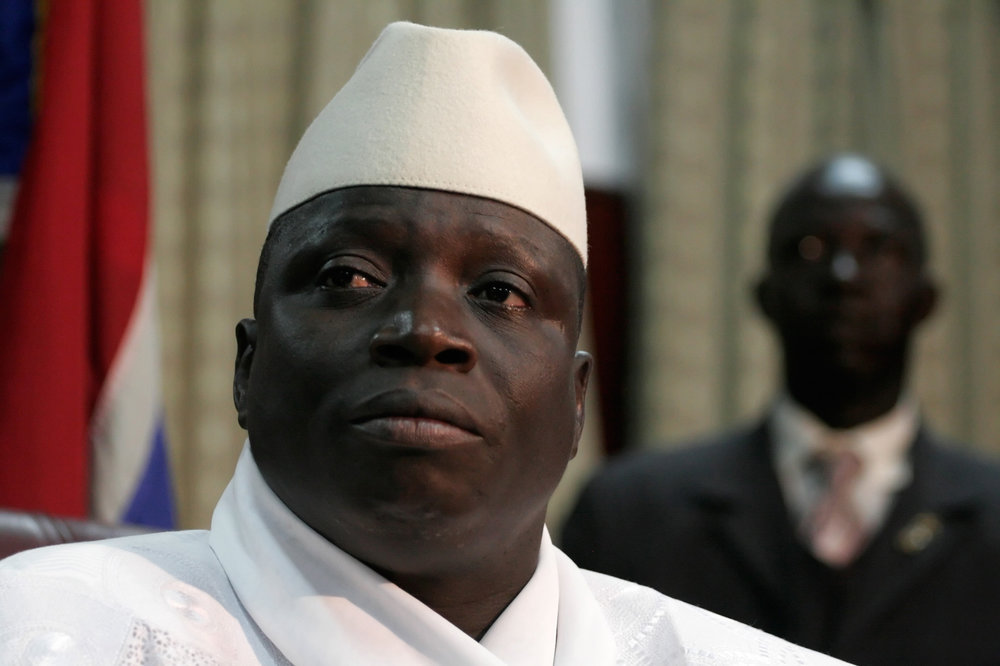African leaders should rally against Gambia’s bully-in-chief
By John Yearwood

On a recent visit to New York City, I looked down from a subway overpass on a fight between two men. The shorter of the two pummeled his opponent, who raced across a busy intersection to escape the blows. Then a surprise: He stopped, stiffened his back, rolled up his sleeves and challenged his attacker to come get him. The short guy, suddenly fearing the worse, turned and ran away crying.
That scene has been on repeat in my mind as I follow recent developments involving a diminutive thug in West Africa: Gambian leader Yahya Jammeh. On December 1, a massive number of Gambians went to the polls in elections that African Union observers hailed as “orderly, peaceful and really serene.” They voted for businessman Adama Barrow, who represented the opposition Independent Coalition of Parties. Jammeh has ruled Gambia for the past 22 years, after staging a coup at the age of 29.
Jammeh was regarded as a statesman when he said after the results were announced that he accepted the will of the people and will step aside when his term ends on Jan. 19. In a stunning reversal a few days later, Jammeh, one of Africa’s few remaining strongmen, announced his change of heart. The elections, he declared, were tainted by “unacceptable abnormalities.” He ordered the military to seal off the election offices and removed election officials from their posts.
How African leaders handle this crisis could determine whether the continent continues on a path toward further political pluralism or surrender to the rule of the malevolent dictator. A team of presidents from the Economic Community of West African States (ECOWAS) flew into the capital of Banjul to plead with Jammeh to cede power, including Muhammadu Buhari of Nigeria, out-going president John Mahama of Ghana, and President Ernest Bai Koroma of Sierra Leone. Exiting State House, Liberian President Ellen Johnson Sirleaf, who led the delegation, looked like she had been sickened by the encounter.
Annulling the elections
Jammeh has held his ground, going on national television Dec. 20 to reiterate that he was “annulling the elections” because not all registered voters cast a ballot, and he gave a tortured explanation of polling figures. He then blasted the West for interfering in Gambia’s internal affairs. He also took on ECOWAS, condemning the organization for its “intervention into the internal affairs of the country as a sovereign state.”
French President Francois Hollande has said that Barrow “must be installed as soon as possible.” The United States, the European Union and the UN Security Council have called for the will of the people to be respected. Even Jammeh’s own U.S. ambassador has abandoned him, saying his boss has “put The Gambia on a dangerous path.”
West Africa, indeed Africa, is at a critical intersection. The continent’s presidents have too often protected autocratic members of their leadership clique to stifle any wind of change blowing from their people. ECOWAS, which has taken the lead in Gambia mediation, has said it will take “all necessary action to enforce the results” of the election. The president of ECOWAS said that the economic bloc is prepared to dispatch troops from Senegal to remove Jammeh if he stays beyond Jan. 19.
That’s a good move, but not the only one that should be played. The African Union should make it clear now that Jammeh will not be welcomed when heads of state gather for the AU summit in Addis Ababa at the end of January. He needs to get the clear message that he has become persona non grata on the continent.
ECOWAS and other African leaders should realize by now that Jammeh is nothing but a thug, whose sole goal is to bully his people and the international community. Allowing him to remain in office beyond Jan. 19 sends a strong message that elections are meaningless just as more and more Africans cry out for electoral change.
Many on the continent who run for office or even participate in elections at high personal risks will no doubt question why bother at all to get involved. That is not the message that ECOWAS or the African Union wants to send.
There have been some victories for democracy, such as in Ghana and Senegal, when losing presidents announced after results were released of their intentions to step aside – and kept their word. It stains the fabric of an Africa enjoying economic and democratic gains to be held hostage by a thug from the tiniest country on the African mainland. It’s time for ECOWAS, the EU and other leaders on the continent to stiffen their backs and roll up their sleeves. Jammeh, like the New York City bully, is sure to scurry in the other direction.
(Source: The Washington Post)
Leave a Comment